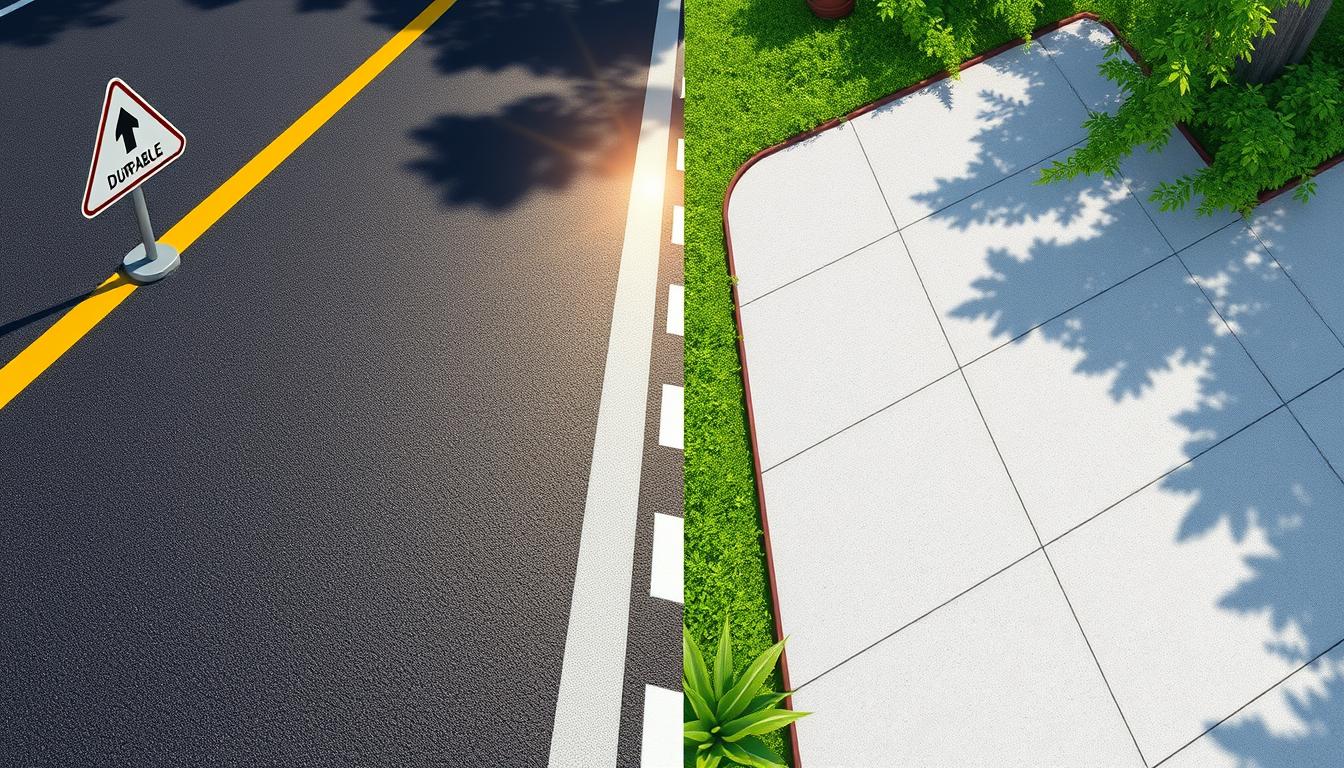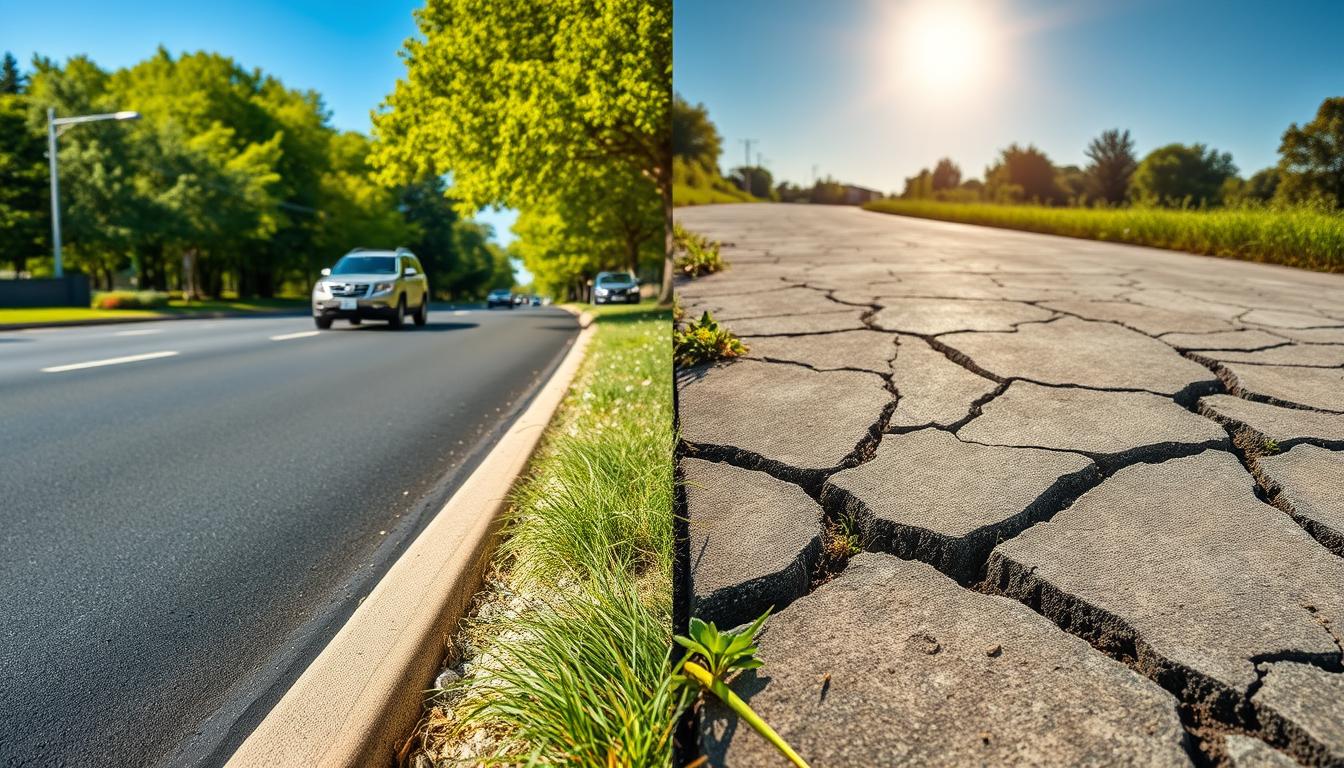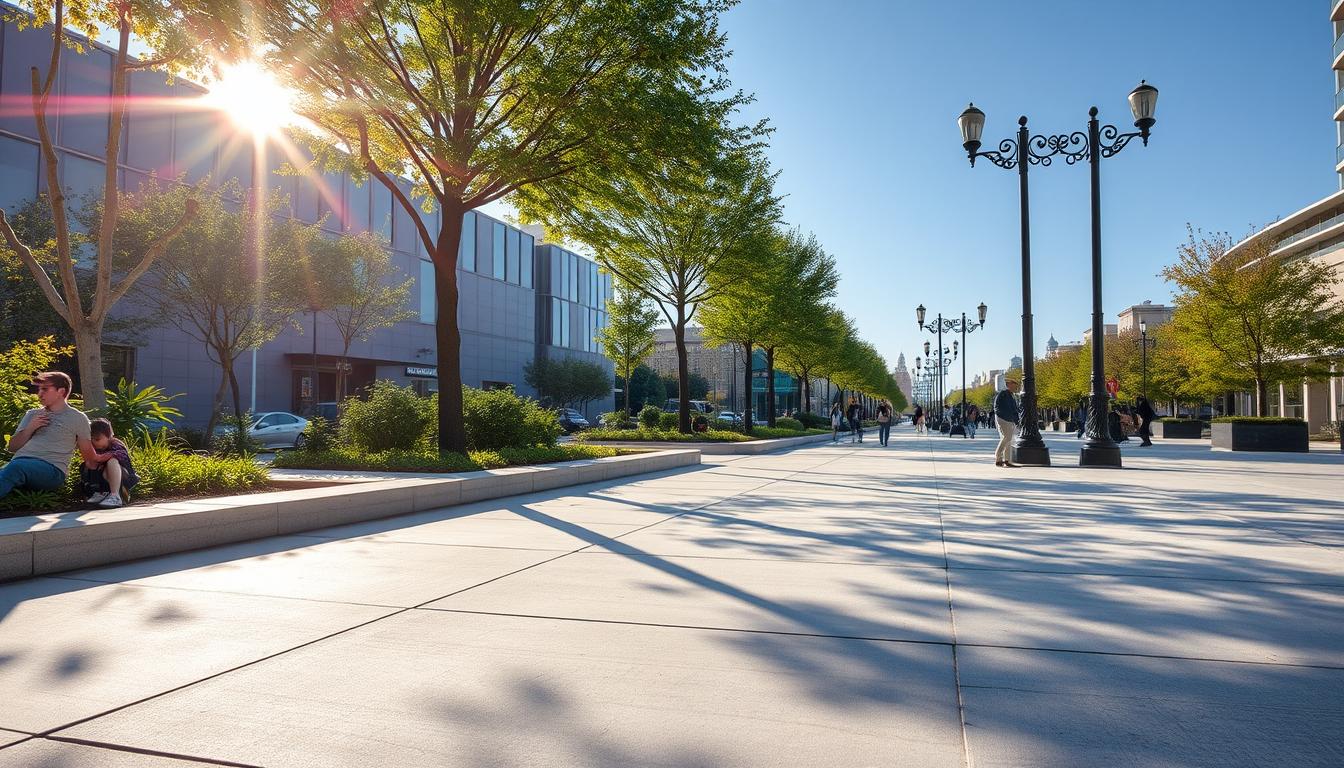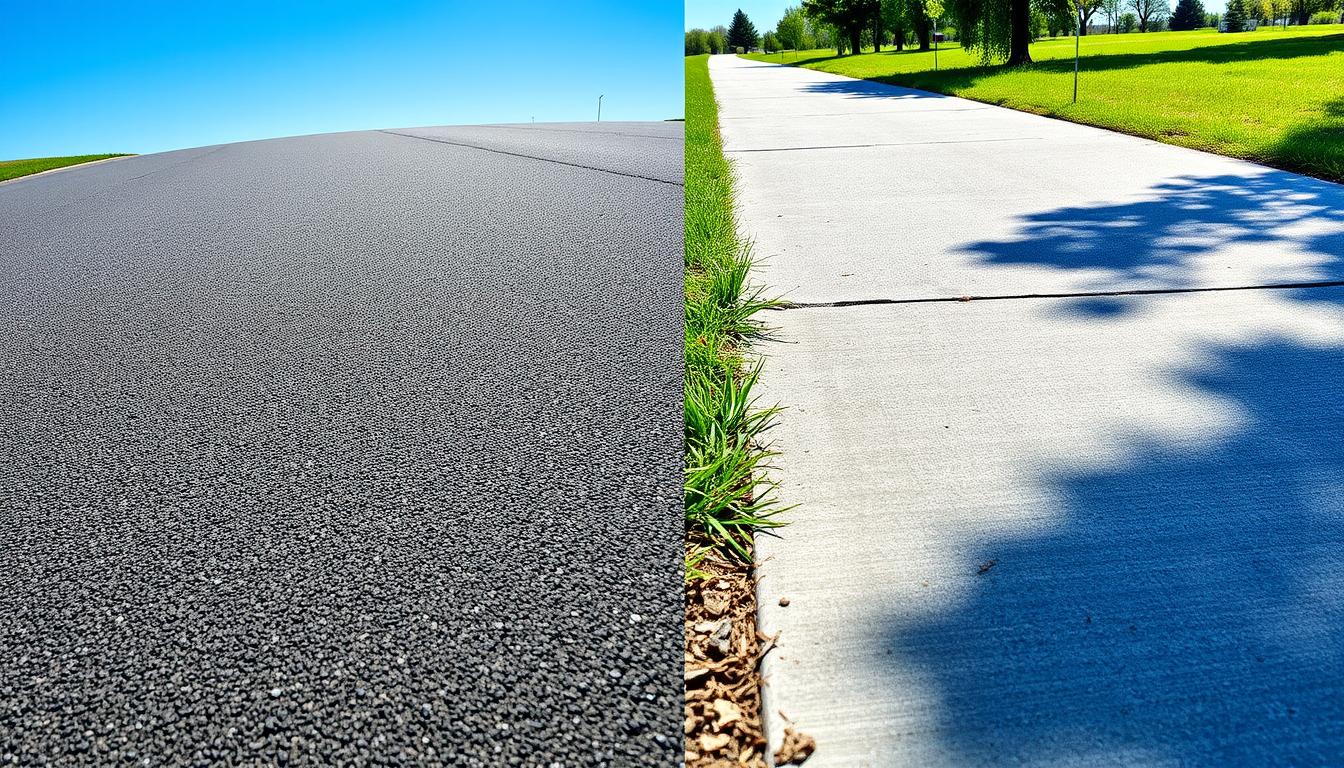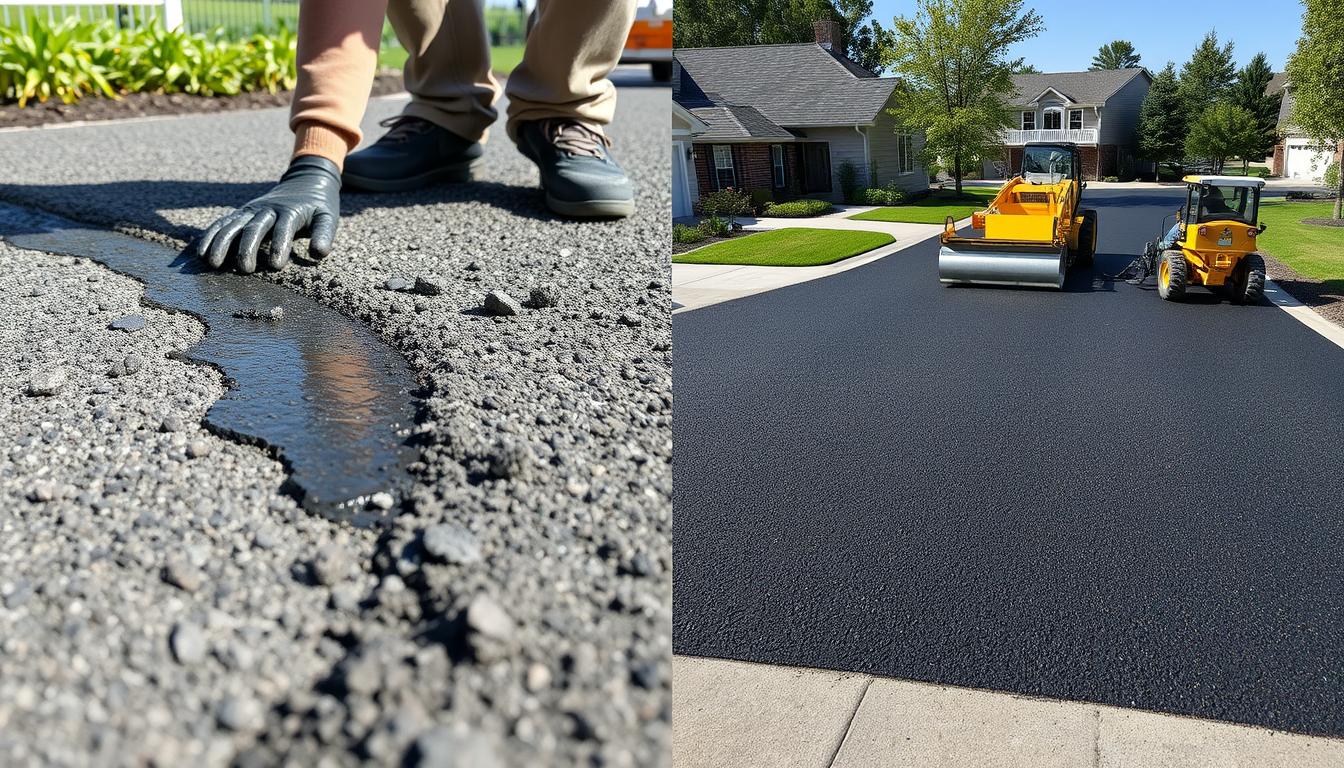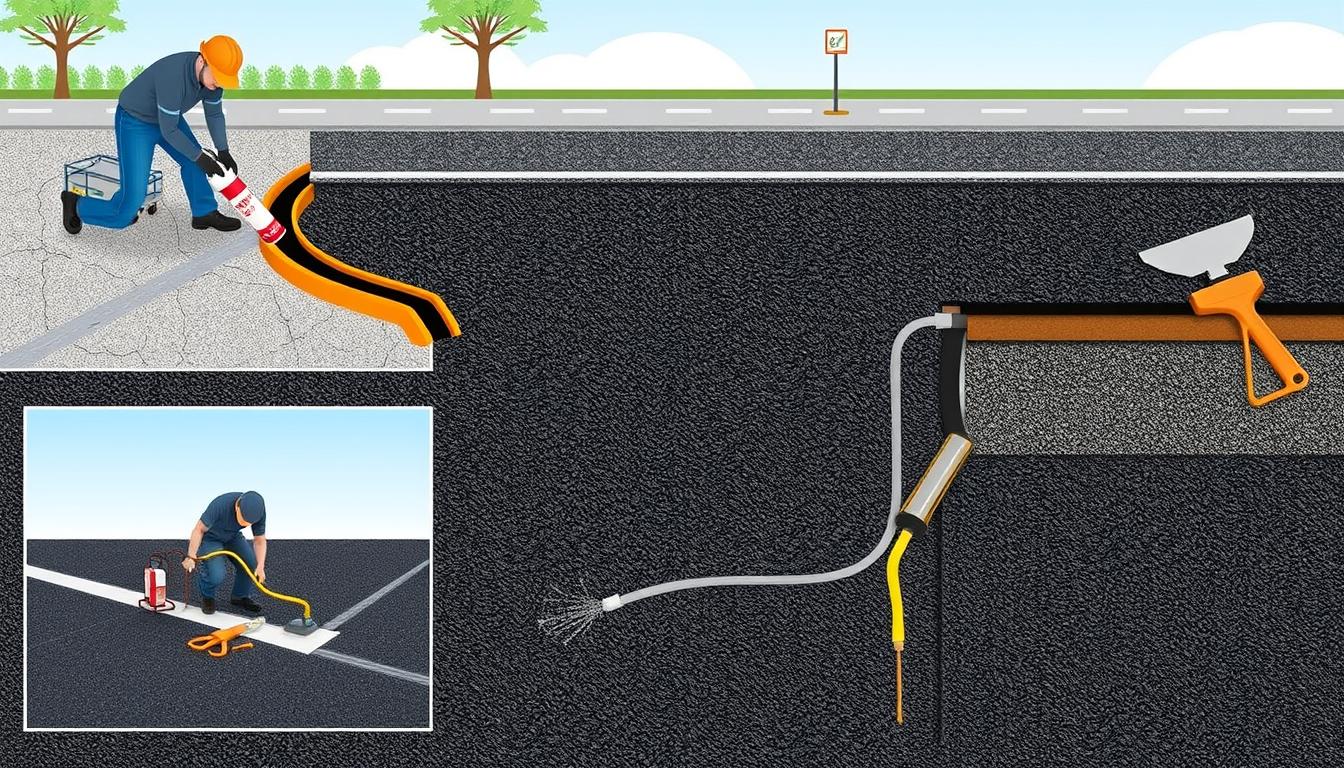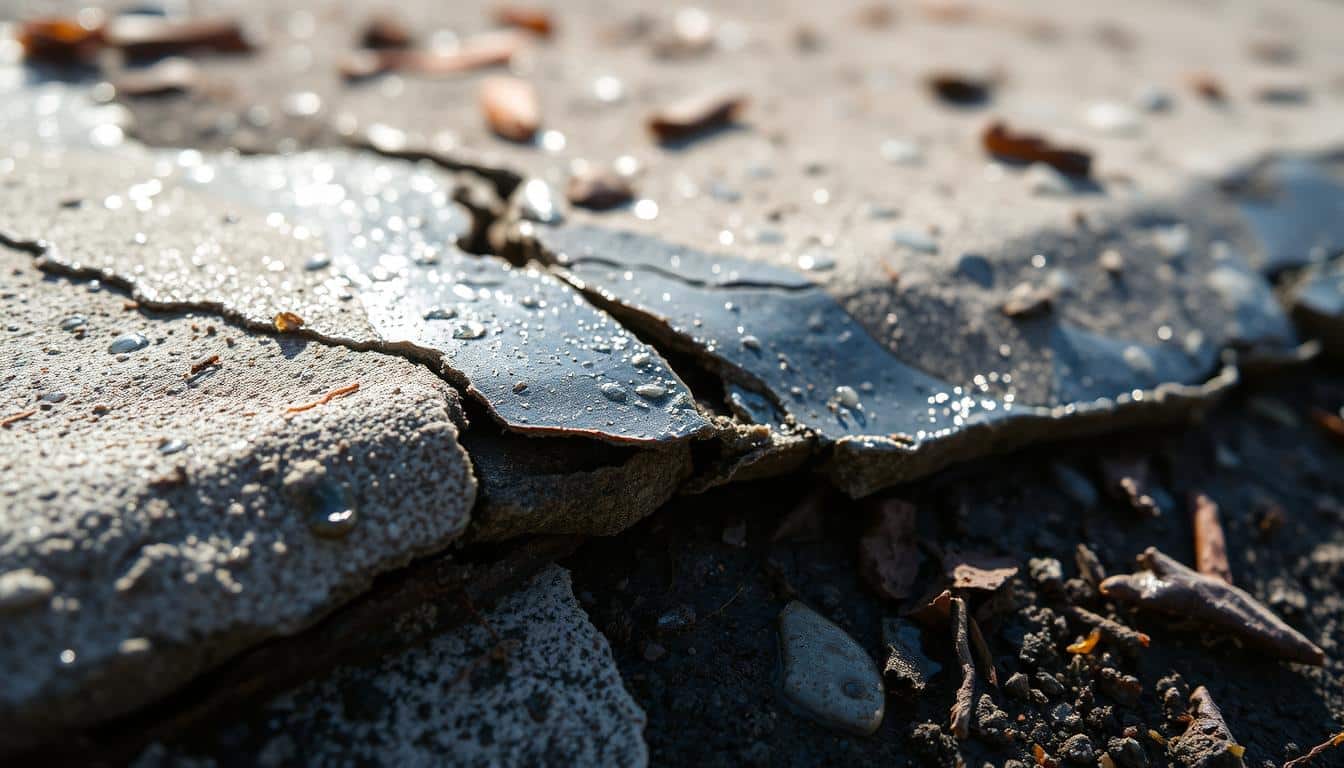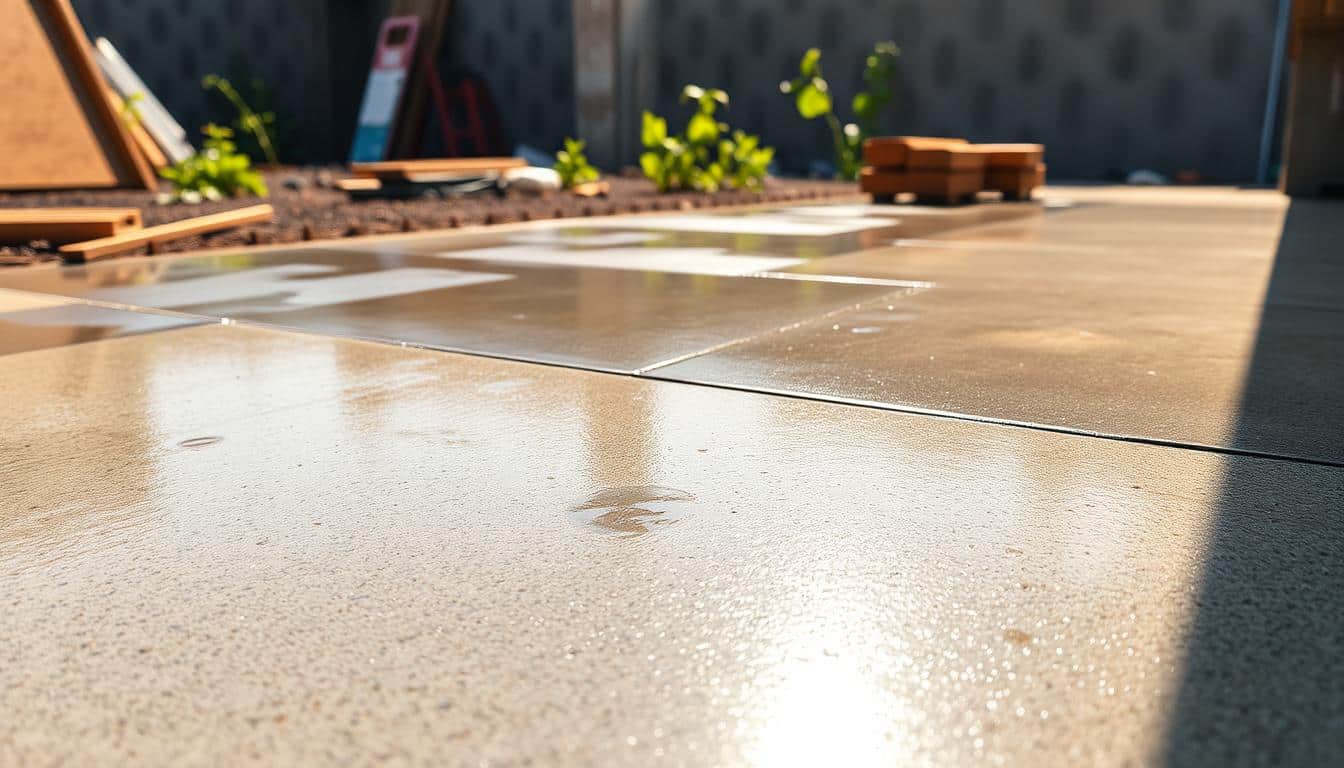Ever wondered if asphalt or concrete is better for your paving project? The choice can be tough due to myths and not knowing the real benefits. We’ll explore the advantages, costs, and upkeep of both. Knowing these differences is key to making the right choice for your needs.
Asphalt is cheaper to start with and easy to care for, working well in cold weather. Concrete, on the other hand, lasts longer, is stronger, and offers more design options. Ready to learn more about these materials and see how they compare? Let’s dive into their features, uses, and what to consider when deciding.
Key Takeaways
- Asphalt is generally less expensive to install than concrete.
- Concrete driveways can last up to 50 years with proper care.
- Asphalt needs more frequent maintenance, making it ideal for busy areas.
- Both materials offer unique aesthetic options, though costs may vary significantly.
- Certain climates favor one material over the other, impacting performance and durability.
Understanding Asphalt Paving: An Overview
Asphalt paving is essential for our roads and driveways. Knowing what asphalt is and how it’s made helps us see its benefits. It’s suitable for both homes and businesses.
Definition and Composition
Asphalt is a black, sticky substance made from aggregates and a petroleum-based binder. It’s heated to make it easy to apply. Once it cools, it becomes a strong surface for many uses.
Common Applications
Asphalt is used in many places. It’s in driveways, parking lots, and roads, mostly in cold areas. It’s chosen for its low cost and lasting quality. It’s also quick to install, saving money upfront compared to concrete.
Lifespan and Maintenance
Asphalt’s lifespan and upkeep show its value. With the right care, it can last 15 to 20 years. This makes it a smart choice for property owners.
Regular maintenance, like sealcoating every three to five years, helps. It protects the asphalt from UV rays and weather damage. This extends its life even more.
Understanding Concrete Paving: An Overview
Concrete paving is a popular choice for many reasons. It’s made from aggregates, cement, and water. After hardening, it becomes a solid and durable surface.
This durability makes it great for many uses. It benefits both homeowners and businesses.
Definition and Composition
Concrete is a composite material. It’s made of coarse aggregates, fine aggregates, cement, and water. When mixed, these parts harden over time.
This hardening process makes concrete strong. It’s perfect for places with a lot of traffic, like commercial driveways and sidewalks. It can handle heavy loads, which is great for industrial areas.
Common Applications
Concrete is used in many places. It’s common for driveways, sidewalks, and parking lots. Its durability makes it great for commercial areas.
It’s also used for decorative projects. Concrete can have different finishes. This adds beauty and value to properties.
Lifespan and Maintenance
Concrete can last up to 30 years if installed right. This is longer than asphalt, which lasts 15 to 20 years. Maintenance is simple, with occasional cleaning and minor repairs.
While concrete needs less repair, big damages can be expensive. Sealants should be applied every 5 to 10 years to keep it looking good.
Cost Comparison: Asphalt vs. Concrete
Choosing between asphalt and concrete paving involves looking at different costs. Each material has its own pros and cons for the initial cost, upkeep, and long-term value. Knowing these details can help you decide between asphalt and concrete paving.
Initial Installation Costs
Asphalt driveway installation costs between $5 to $15 per square foot. This makes it a more affordable choice. Concrete, on the other hand, costs between $8 and $18 per square foot. Many homeowners look at these costs to find the best fit for their budget. Asphalt is often cheaper upfront because it uses less expensive materials and is quicker to lay.
Long-term Maintenance Costs
Asphalt might seem cheaper at first, but it needs more upkeep. Sealcoating every 2-5 years and fixing wear and tear can increase costs over time. Concrete, while more expensive to start, needs less maintenance. Its durability and lower upkeep costs can make it a better choice in the long run.
Resale Value Considerations
Resale value is another important factor. Well-kept concrete driveways can boost property value with their elegant look. Asphalt, being more budget-friendly, might not have the same appeal. Knowing how paving materials affect resale value helps homeowners make better choices.
Durability and Longevity: A Detailed Analysis
Choosing between asphalt and concrete means understanding their durability and how long they last. Both have their own strengths and weaknesses. They handle different weather conditions and wear and tear in different ways. Knowing how long each material lasts helps decide which one is best for certain jobs.
Resistance to Weather Elements
Asphalt works well in cold weather but can get soft in extreme heat. Concrete, on the other hand, is very durable against temperature changes. But, it can crack from freeze-thaw cycles. It’s important to think about these points when deciding between asphalt and concrete, based on the weather.
Wear and Tear Factors
In places with a lot of traffic, asphalt is often a good choice because it’s easy to fix. It’s used for 94% of the country’s paved surfaces. Concrete can handle heavy loads but might crack under stress or bad conditions. Looking at how each material holds up to wear and tear helps pick the right one for busy areas.
Lifespan in Various Conditions
How long paving materials last can vary. Asphalt can last 20-30 years with regular care. Concrete can last 30-50 years or more. The choice between them depends on the weather and how much they’ll be used. Things like the local climate and how much traffic there is are key to making a good decision.
Aesthetic Options: Customization Possibilities
Choosing between asphalt and concrete gives you many options for looks. The color and finish of both materials change how driveways and outdoor spaces look. Asphalt has a sleek, uniform black look. Concrete, on the other hand, offers a wide range of colors and textures through stamps, stains, and finishes.
Color and Finish Variations
Concrete can be customized to fit many tastes, making it great for decorative pathways and driveways. Asphalt’s classic look is practical but lacks the variety concrete provides. Many homeowners choose concrete for its customization options to boost curb appeal.
Design Opportunities
Concrete’s adaptability opens up unique design possibilities. Homeowners can create artistic layouts and functional spaces, making concrete popular for large outdoor areas. Asphalt might be cheaper for big projects, but it can’t match concrete’s design flexibility.
Landscaping Integration
Integrating paving with landscaping shows how aesthetic choices impact outdoor design. Concrete’s smooth finish complements gardens and yards, creating a cohesive look. Asphalt offers a simple, functional solution that blends well with greenery. The choice of paving greatly enhances outdoor space aesthetics.
For custom driveway solutions that improve both durability and looks, explore professional services offered by HT Paving and Seal Coating.
Environmental Impact: Sustainability Considerations
Choosing the right paving materials is key for our planet. Both asphalt and concrete have their own effects on the environment. We need to think carefully about our choices.
Recyclability of Asphalt
Asphalt is very recyclable, making it a green choice. It can be turned into new asphalt, saving raw materials. This process saves millions of tons of asphalt each year.
Using recycled asphalt can make up to 85% of a new mix. This helps the environment by using less energy and resources. It’s a big step towards a more circular economy.
Carbon Footprint of Concrete
Concrete production is a big source of carbon dioxide, mainly because of cement. Cement makes up about 8% of global emissions. Concrete driveways last long but need a lot of energy to make.
This high energy use is a big concern. It makes concrete less sustainable than asphalt in terms of carbon emissions.
Long-term Sustainability Practices
Both asphalt and concrete have their own benefits and drawbacks for the future. Asphalt is getting greener with new technologies. Concrete, on the other hand, lasts longer and needs less upkeep.
But, both materials can cause water runoff. There are special types of asphalt and concrete that help manage water better. Thinking about these points helps us understand the environmental effects of each.
Ease of Installation: What You Need to Know
When choosing between asphalt and concrete for paving, knowing how easy they are to install is key. Each material has its own installation process. This affects how long it takes to install and how much upkeep it needs later on.
Installation Process Overview
Asphalt is quicker to install, often done in 24 to 48 hours. Concrete, on the other hand, needs at least a week to be ready for cars. Many homeowners prefer asphalt because it’s faster and less of a hassle.
Time Considerations for Each Material
Weather is important for both asphalt and concrete installation. Asphalt works best in warm weather, making it stick and bend well. Concrete needs specific weather to avoid cracks, making timing very important.
Repair and Maintenance Timelines
Asphalt and concrete have different repair needs. Asphalt fixes are simple and quick, often just needing a seal for small cracks. Concrete repairs are more complex, needing color matching and big fixes for cracks or spalling.
HT Paving and Seal Coating Services: Our Commitment
At HT Paving and Seal Coating Services, we cherish family values in paving. With nearly 40 years in the Bay Area, our family business excels in asphalt services. We serve both homes and businesses with a legacy of quality.
Family Business Values and Heritage
Our family-owned status shapes our service approach. We value integrity, hard work, and customer happiness. These values ensure personalized service and attention to detail in every project.
Safety Practices and Protocols
Safety is our top priority in paving projects. We follow strict safety rules to meet local and industry standards. This protects our team and our clients’ properties.
Customer Satisfaction Guarantee
We aim to exceed client expectations. Our goal is quality work and efficient project management. We guarantee customer satisfaction for all asphalt services.
For top-notch asphalt services, choose HT Paving and Seal Coating Services. Learn more on our website.
Conclusion: Making an Informed Choice
Choosing between asphalt and concrete for your driveway involves careful thought. Asphalt is cheaper, costing $3 to $5 per square foot. Concrete, though pricier at $6 to $10 per square foot, lasts longer, up to 30 years, compared to asphalt’s 15 to 20 years.
Consider the upkeep each requires. Asphalt needs sealcoating every 3 to 5 years and can be damaged by oil and petrol. Concrete is stronger but fixing it can be costly. Knowing these differences is key when choosing a paving material.
If you want to learn more about paving, check out extra resources. Articles, studies, and local advice can help. Having the right information helps you make a choice that fits your budget and future needs.

